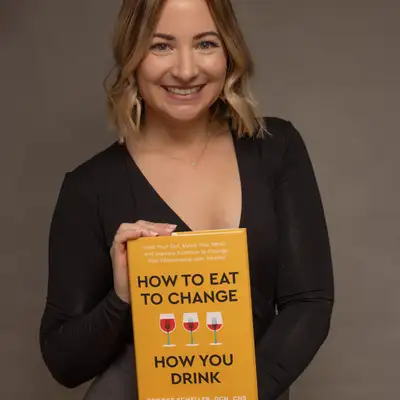What You’ll Learn in This Episode:
- What GLP-1 medications are and how they work
- Why they might reduce alcohol cravings—and what the science says so far
- Who might benefit most from GLP-1s—and who should be cautious
- Common side effects and risks associated with these drugs
- Natural strategies to support craving reduction and metabolic health
- Why addressing core beliefs about alcohol is critical to long-term change
- Dr. Brooke Scheller’s program: Functional Sobriety
- Dr. Scheller’s book: How to Eat to Change How You Drink
Website: www.mollywatts.com
Instagram: @alcoholminimalist
Join the Private Facebook Community: “Alcohol Minimalists: Change Your Drinking Habits”
Download Molly’s free guide “Alcohol Truths 2023” and learn how to identify your personal safe level of drinking at mollywatts.com/resources
Low risk drinking guidelines from the NIAAA:
No more than 3 drinks in one day and no more than 7 drinks per week.
Abstinence from alcohol is the best choice for people who take medication(s) that interact with alcohol, have health conditions that could be exacerbated by alcohol (e.g. liver disease), are pregnant or may become pregnant or have had a problem with alcohol or another substance in the past.
Following these guidelines reduces the risk of health problems such as cancer, liver disease, reduced immunity, ulcers, sleep problems, complications of existing conditions, and more. It also reduces the risk of depression, social problems, and difficulties at school or work.
Creators and Guests
What is Alcohol Minimalist: Change Your Drinking Habits! ?
Change your relationship with alcohol without shame, guilt, or going sober. Join science-based coach Molly Watts to break habits and find peace through mindful drinking.
Hosted by author and coach Molly Watts, this show is for daily habit drinkers, adult children of alcoholics, and anyone stuck in the “gray area” of alcohol use.
Each episode blends neuroscience, behavior change psychology, and real-world strategies to help you build peace with alcohol — past, present, and future.
You’re not broken. You’re not powerless. You just need new tools.
Less alcohol. More life. Let’s do it together.
New episodes every Monday & Thursday.
Becoming an alcohol minimalist means:
Choosing how to include alcohol in our lives following low-risk guidelines.
Freedom from anxiety around alcohol use.
Less alcohol without feeling deprived.
Using the power of our own brains to overcome our past patterns and choose peace.
The Alcohol Minimalist Podcast explores the science behind alcohol and analyzes physical and mental wellness to empower choice. You have the power to change your relationship with alcohol, you are not sick, broken and it's not your genes!
This show is intended for educational purposes and does not constitute medical advice. If you are physically dependent on alcohol, please seek medical help to reduce your drinking.
